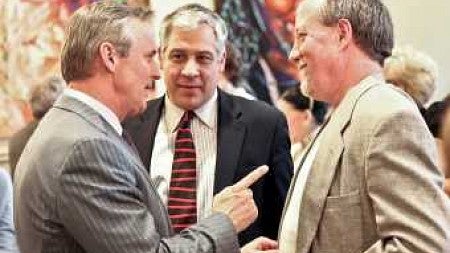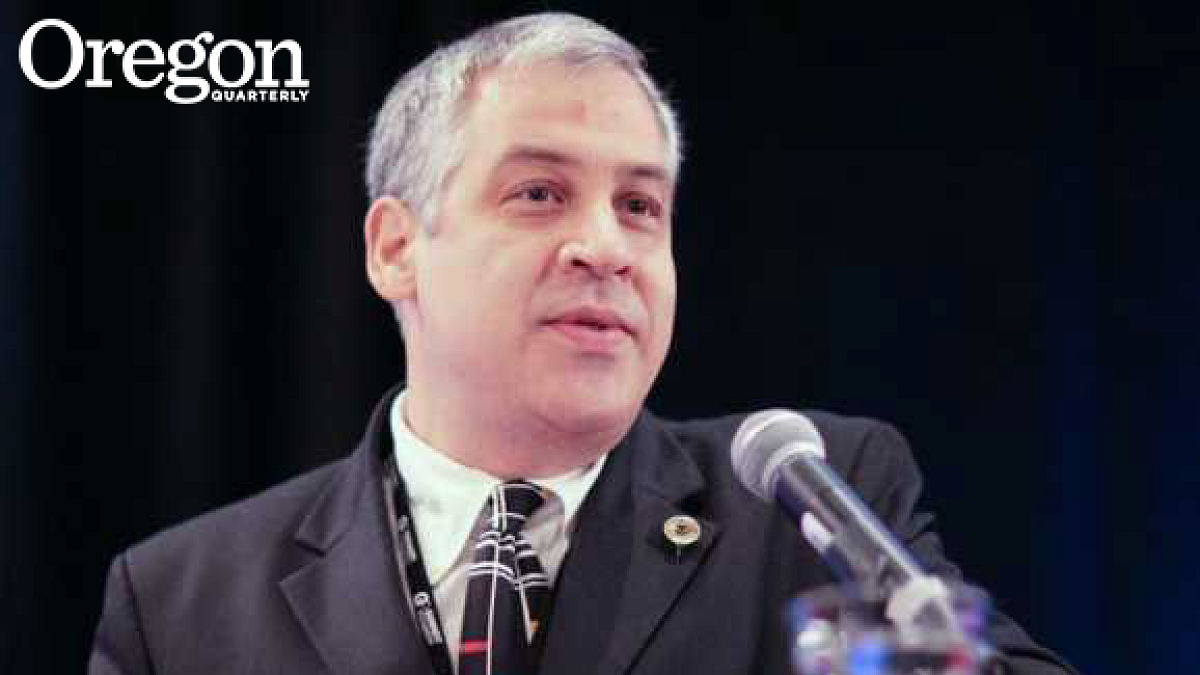It’s hard to pinpoint exactly what it was that convinced Dane Claussen ’84 to join the American Civil Liberties Union (ACLU) some thirty-two years ago.
As a budding journalist at Crescent Valley High School in Corvallis, Clausen likely had his interest kindled by curiosity over the First Amendment rights of students. At the same time, the ACLU was very much in the news, a target of national attention over its controversial opposition to efforts to outlaw neo-Nazi parades in Skokie, Illinois. The ACLU saw the matter as a free speech issue—a position later upheld by the U.S. Supreme Court.
Although the Skokie case certainly wasn’t the primary reason he joined the ACLU, Claussen, forty-eight, has long supported the organization’s willingness to do just what it did—wade deep into the public fight to support constitutionally protected free speech and expression.
This year, Claussen went back to his roots, philosophically speaking. He took his thirty-two-year-old ACLU membership to a new level, leaving a tenured teaching position as chair of faculty at the School of Communication at Point Park University in Pittsburgh, Pennsylvania, to become executive director of the ACLU of Nevada.
“Over the years I’ve been a member, I haven’t always agreed with all the positions the organization has taken—I don’t know that every member does. But the ACLU takes so many important positions on such a wide range of issues,” Claussen says. “It’s the diversity of those issues that I’m interested in.”
You want issues? He’s got issues. Racial justice. Religious freedom. Police practices. Voting rights. Criminal justice. Open government. Free speech. Privacy rights. Education. With the U.S. Constitution’s Bill of Rights as a guide, the organization works to protect individual rights and civil liberties through legislation, litigation, and community education.
And though it may seem a considerable and unusual career leap, Claussen has found the move to be a good fit. As a journalist and educator—his primary focus was media law and regulation, with a First Amendment emphasis—he’s no stranger to public service and the political arena.
Born in Salem, the fifth-generation Northwesterner was raised in a home where politics were a fact of life. “My parents were working on Mark Hatfield’s campaign back in the 1950s,” he recalls.

He arrived at the UO in the early 1980s determined to become a journalist. He quickly found his way to a job at the Oregon Daily Emerald, serving—during his freshman year—as associate editor on the student government beat.
Frustrated with the lack of divergent perspectives being expressed on campus issues, Claussen would eventually help found the Oregon Commentator, launched in October 1983 as “a conservative journal of opinion.”
“There was a certain amount of ‘stick-it-in-the-eye-of-the-Emerald’ spirit,” he chuckles. “The ODE was the only student media on campus, really. So the paper loomed large on campus in framing things and setting the agenda.”
The Commentator was housed in an office at the EMU that was “honest to God, probably the size of a large closet,” and Claussen paid production costs for the first issue out of his own pocket. The experience was fun and exhausting, exhilarating and humbling. And it was a remarkable classroom all its own.
“At the time, and since, I think it was important to have an alternative on campus, to be part of that voice,” he says. “I’m glad that I did it.” And that voice has continued; By the Barrel: 25 Years of the Oregon Commentator was recently published (see “Beware the Underdog,” in the Spring 2010 Oregon Quarterly).
Following graduation, Claussen earned an MBA in corporate finance and labor relations from the University of Chicago, followed by several years spent editing and publishing community newspapers and newsweeklies as well as business and trade magazines.
“One thing I’ve always told people about journalism is don’t get too excited about getting a job at a big daily—you’ll be a small cog in a big wheel. The smaller the medium, the more diversity, variety, experience, and responsibility you’ll get,” he says.
Claussen went on to earn an MS degree in mass communications from Kansas State University and a PhD in mass communication from the University of Georgia, launching a solid academic career.
But after more than a decade of teaching on the college level, he found that he was ready for something new, the next big challenge.
“Certainly, I had accomplished a lot of what I’d wanted to accomplish,” Claussen says. “It was a huge step in my life to resign a tenured full professor’s position. There were a lot of considerations.
“After all these years as a member of the ACLU, I guess you could just say I’m finally putting my mouth where my money is,” he adds.
With his new job, Claussen moved from the editorial sidelines squarely into a role as public watchdog, advocate, and legislative lobbyist. Suddenly he was in the center of some of the state’s stickiest hot-button issues.
It was exactly what he’d hoped for.
“The Nevada state legislature meets only once every two years, starting in early February,” he recalls. “We were reading every bill that was of even potential interest.”
Within weeks of starting the job early this year, Claussen had become a legislative lobbyist. A talented and knowledgeable staff helped ease the way. In journalism, you frame the news. Now, he was making it.
There were pleasant surprises—the ACLU was geared up to fight a number of anti-immigration bills that were introduced, which never even got hearings. The Nevada Legislature also passed several bills that extended nondiscrimination protections to the lesbian, gay, bisexual, and transgendered community.
And there were disappointments. An effort to impose a two-year moratorium on the death penalty never got off the ground. Even a proposed study to examine the costs of implementing the death penalty in Nevada was vetoed by Governor Brian Sandoval.
Then there was the work that might seem, well, somewhat unique to the region. The rights of celebrity impersonators to work on Las Vegas sidewalks. The rights of visitors attending the Burning Man festival. Simplifying the state’s complex rules for the restoration of voting rights for felons who have completed their criminal sentence—a system so complicated and cumbersome that many county clerks can’t even understand it, Claussen says.
As in journalism, the ACLU presents different challenges, fresh issues every day. And that appeals to Claussen.
“Sometimes, you have to convince yourself and others that there is more to Las Vegas than just the strip—there are real people, real lives. Teachers, truck drivers, and dentists. It’s not just all blackjack dealers.”
Every day, Claussen knows that he is doing work that matters. And it is good to be back on familiar ground.
“I know the West. I understand the West,” he explains. “I understand the constituencies of liberals, conservatives, and libertarians that you can find throughout the West, and most of them are very strong. To know something about the history and the people and the politics of the West, that’s all very helpful. If I’d taken an executive director’s job in Arkansas, I might go years before I understood the place.”
—By Kimber Williams, MS '95


